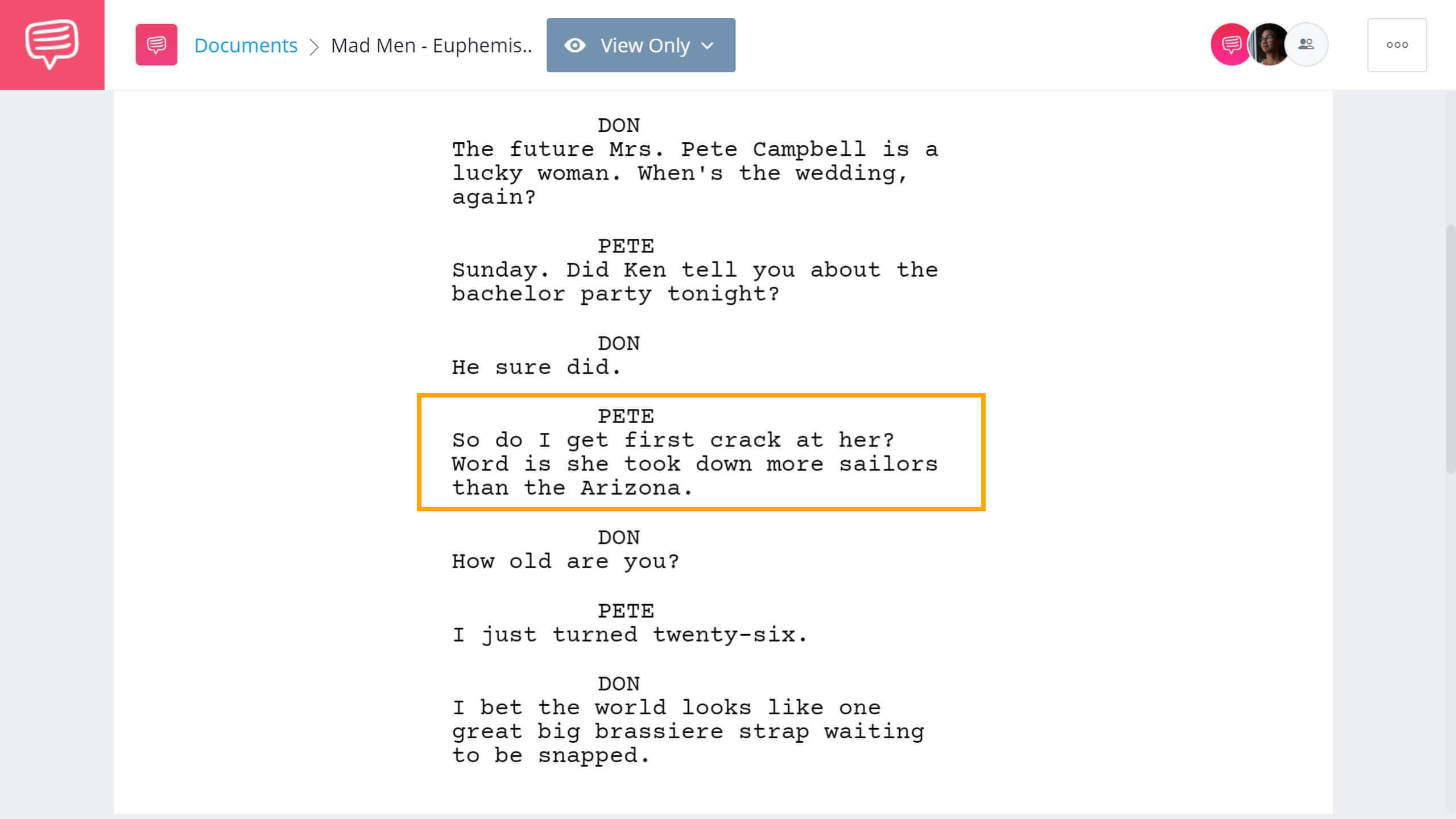There are various literary devices that cross over from literature to everyday language. Perhaps the most commonly used literary device in everyday conversations is the euphemism. Euphemisms can change over time and change between cultures but what is a euphemism? What does euphemism mean? In this article, we’ll take a look at how this literary technique that is used in both writing and everyday language to convey meaning.
Euphemism definition
First, let’s define euphemism
Euphemism may sound like a foreign literary term, but odds are you have used one in the last week. Cultural vernacular is rife with them and are used in common conversations. So, what does euphemism mean? Let’s take a look at the euphemism definition to find out.
EUPHEMISM DEFINITION
What is a euphemism?
A euphemism is an appropriate expression used in the place of a phrase or words that may be found inappropriate or offensive. Euphemisms are commonly used in daily language and literature to replace language that some may find displeasing.
Euphemistic language is commonly used in literature, especially older works, as a way to convey a message without risking the chance of it being barred to censorship for crude language.
Euphemism examples:
- “Passed away” instead of “died”
- “Let go” instead of “fired”
- “Make love” instead of “sex”
- “Put down” instead of “euthanized”
Euphemism meaning
What is a euphemism used for?
Euphemistic language can be found throughout both in literature and in everyday language. But what is a euphemism used for? To better understand the meaning, let’s take a look at its function.
While everyone uses euphemistic language as a means to communicate something else, the reason for the substitution may differ.
1. Avoid offensive language
Specifically in past conservative time periods, euphemisms were commonly used in everyday conversations to avoid offensive or even taboo language. The most common subject that uses euphemistic language is sex.
Examples like “making love,” “the birds and the bees,” and “going all the way” were all used to discuss sexual acts without ever saying possibly offensive language. This video breaks down how euphemisms are used in everyday language for uncomfortable conversations and to avoid displeasing language.
What is a Euphemism?
2. Character traits
When a specific character in a film or in literature uses a euphemism, one can gather that the character is rather conservative or mindful of using inappropriate language. The choice to say the inoffensive version of the sentence is a direct manifestation of their characterization.
3. Establish time period
Euphemisms often change or are more or less apparent depending on a story’s time period. If a novel, film, or television show is taking place within a specific time, euphemism can be used to portray the vernacular of the time period.
This can also help establish the cultural norms of the time period’s society. For example, euphemistic language in the 1920s about sexual intercourse is far different from expressions used in the 1970s to describe the same thing.
4. Variety in language
Euphemisms are ways to use different words to say the same thing. This can allow writers to be creative and introduce variety in their writing so that actions or phrases do not become monotonous. Euphemisms can be poetic and create imagery that literal language cannot.
For example, in Othello, Shakespeare uses the term “the beast with two backs” as a euphemism for sex. This example creates both imagery and variety more than simply saying the two were having sex.
Related Posts
Euphemism examples
What is a euphemism in literature?
A euphemism is a word or phrase that is rife within everyday language and conversation. They allow us to have uncomfortable conversations without using unsettling language.
For example, a boss telling an employee they are “let go” instead of “fired” aims to soften the blow. But what about euphemism examples in literature?
In George Orwell’s 1984, euphemistic language is used within the story to portray the propaganda of a dystopian society. In the book, “newspeak” became the official language of Oceania. It utilizes euphemisms like “joycamp” instead of “forced-labor camp” as well as “Minipax” for “Minister of War.”
The use of euphemistic language in 1984 effectively criticizes a government's attempts to mislead citizens with persuasive propaganda.
What is a Euphemism
Euphemism examples in television
One of the reasons writers use euphemisms that we listed above was to establish a story’s time period. This is especially true when writing and creating a period piece. What is a euphemism’s role in a period piece? Let’s take a look at some television examples to better understand.
For example, the 1960s American society was culturally more conservative than it is now. In the Mad Men pilot episode, screenwriter Matthew Weiner uses euphemisms to establish this conservative culture.
We brought the Mad Men pilot script into StudioBinder’s screenwriting app to analyze this further. Take a look at how Pete Campbell creates his own expression for saying a woman has slept with a lot of men in this scene.
While even this euphemism would be seen as offensive in the 1960s, it shows how conservative and polite the language was during the time. This is an important aspect when writing a period piece.
As you can see from these examples, euphemism is more than just a way to avoid crude language. They can be used within literature and screenwriting to both establish societal norms and critique them. As a writer, consider using euphemisms as a means to reflect the world you are creating and the characters that inhabit it.
Related Posts
UP NEXT
How writers use metaphors
Euphemisms allow writers to use specific language to say something else. Another literary device that does this is the metaphor. Metaphors can be extremely effective and communicate a complex idea or concept. In our next article, we break down what a metaphor is and how it can be used to elevate your writing.

